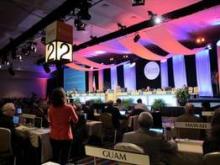PHILADELPHIA – The American Academy of Family Physicians Congress of Delegates has approved a new policy to support civil marriage for same-sex couples, making it one of the few medical societies to explicitly endorse gay marriage.
AAFP policy now states that the organization supports "civil marriage for same-gender couples to contribute to overall health and longevity, improved family stability, and to benefit children of gay, lesbian, bisexual, transgender (GLBT) families."
The congress voted 75-44 to approve that language, which was crafted from two resolutions brought forward by the resident and student sections. This was the third year in a row that the congress had weighed whether the organization should give its backing to same-sex marriage. And, as in past years, debate was lengthy and impassioned.
Many supporters testified that their own same-sex partnerships had suffered as a result of being denied the ability to marry.
Dr. Mark Dressner, president-elect of the California chapter, said that he felt that he and his partner had been treated as second-class citizens. Others spoke of the emotional and physical damage they had witnessed in patients and family members as a result of discrimination against homosexuals.
Dr. Lloyd Van Winkle of Castroville, Tex., who was just elected to the AAFP board, said that a young relation* committed suicide at age 19 because he felt persecuted about his homosexuality.
Dr. Paul W. Davis, a delegate from Alaska, spoke about his long journey from "the extreme conservative religious right wing on this debate to a committed solidarity with the opposite pole."
Dr. Davis said that he had watched patients struggle with major depression over their sexual and gender identity. "I am not proud of the fact that I am a late adopter on this important issue," he said, urging his fellow delegates that "we need to boldly make a decision and move forward."
But opponents said that AAFP should not be wading so deeply into what they considered largely treacherous political waters.
Dr. Justin V. Bartos, a delegate from Texas, said that his state’s chapter opposed the resolution because it was too much of a political statement and diverged from the AAFP’s mission.
Members of the Texas Academy of Family Physicians "do not want us to endorse such a politically polarizing issue," Dr. Bartos said. He noted that family doctors in Texas are struggling to get their state legislature to restore funding for community-based residencies, and that lawmakers in the largely conservative state would note the AAFP’s support of gay marriage.
The Tennessee delegation also opposed the policy change for the same reasons – that it would politicize the AAFP.
Another Texas delegate, Dr. Erica Swegler*, said that current AAFP policy was enough to indicate the organization’s support for equal access to health care for all Americans.
During testimony before the reference committee charged with weighing the policy change, an Arkansas delegate said that more than 300 members might leave the AAFP if it gave its approval to gay marriage.
The AAFP joins the American Psychiatric Association and the American Psychological Association in supporting same sex marriage. The psychiatrists approved a resolution of support in 2005, and the psychology association made it official policy in 2011.
The American Medical Association has not backed gay marriage specifically, but has a host of policies supporting equality for same-sex households.
The American College of Obstetricians and Gynecologists in 2009 issued a policy statement that same-sex couples should get same legal rights as married heterosexuals.
*Correction, 11/8/12: An earlier version of this story misidentified Dr. Van Winkle's relation and misspelled Dr. Swegler's name.


